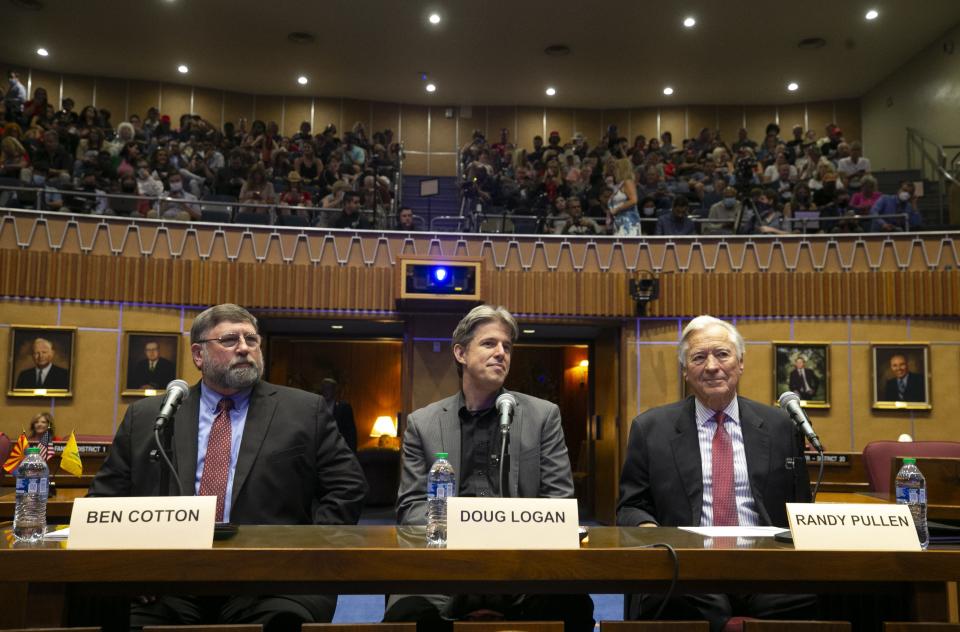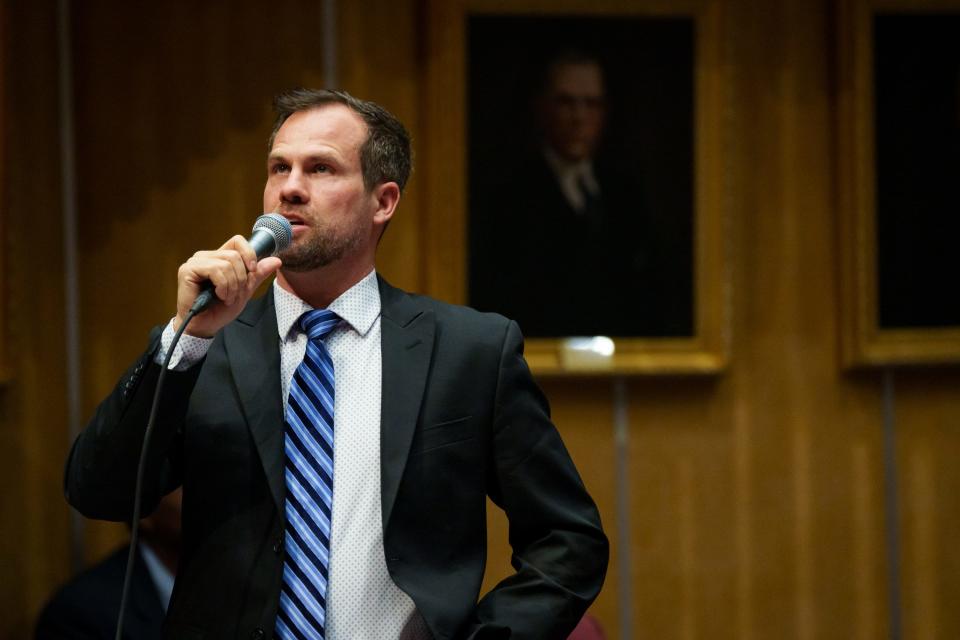It took years for truth about election 'audit' to emerge. Why The Arizona Republic kept fighting
- Oops!Something went wrong.Please try again later.
Texts and emails released long after the so-called Arizona "audit" ended proved — beyond a doubt — the effort was encouraged, funded and carried out by loyalists to Donald Trump.
Those details could have remained hidden without The Arizona Republic fighting for more than two years for information about the 2020 ballot review.
What Arizonans didn't know when then-Senate President Karen Fann announced the “audit” was that it was part of a nationwide effort to undermine elections in states Democrat Joe Biden won — and that the people involved were working behind the scenes to access voting equipment in other states as well as Arizona.
At the outset, Fann said the audit "absolutely has nothing to do with Trump."
Key details emerged in December 2022 and throughout 2023 based on public records released only because The Republic went to court to demand them.
Among those details: The lead contractor couldn't tabulate hand tallies done at Arizona Veterans Memorial Coliseum. And before, during and after the review, he exchanged text messages with a who's who of Trump allies trying to sow distrust in election results across the county.
While the “audit” and the lawsuit might be history, the spectacle looms over the state. It fueled unsupported claims elections were suspect or compromised.
"It's important to look ahead and cover the issues and politics of 2024. But it's essential to keep in mind what was discovered about the 'audit' and its participants' related activities. It was all a sham — and a similar ploy could happen again," said Greg Burton, Republic executive editor.
"Knowing what happened in the past will inform Arizonans about what to watch for in the next election. That full understanding would not have been possible without The Republic's tireless efforts, in our legal battle and in our newsroom, to reveal the truth."
The Republic’s lawsuit is among the biggest public records cases fought in the state, with the news organization now seeking $690,000 from the state Senate and Cyber Ninjas to cover its legal fees.
Here is a recap of the legal battle and what was learned along the way.
A hunt for Trump money, a scramble for results
When the "audit" was announced in 2021, lawmakers in charge promised an objective review. The plan to recount nearly 2.1 million ballots stretched into months, yielded zero evidence of fraud and has so far cost county taxpayers more than $5.5 million.
Arizona media had to fight in court even to get access to the "audit" as head contractor Doug Logan and his Florida company, Cyber Ninjas, set up shop in the coliseum. Once work began, Logan and the Senate refused to release documents about the "audit" under the Arizona Public Records Law, so The Republic sued, as did a group called American Oversight.
Logan and the Senate would fight that lawsuit through a number of appeals over the next two years, but the lawsuit almost immediately compelled Logan to release financial records that showed partisan groups affiliated with Trump were bankrolling him.
Logan and the Senate tried to create an air of objectivity as the work took place in 2021. But more than 18 months later, The Republic's lawsuit forced Logan to release documents that showed he reached out to Trump through associates to ask the former president to pay for the “audit” and that Trump was keeping tabs on the effort. Those and other messages uncovered in the litigation erased any credible claim the work was meant as a fair and objective review.
The Republic’s lawsuit also uncovered messages that showed that Logan wasn’t familiar with Arizona election law when he was hired and ultimately could not add up the tally sheets that “audit” workers used to count votes.
"Looks like basically our numbers are screwy," Logan said in a Sept. 13, 2021, text message.
Former Attorney General Mark Brnovich’s office investigated the 2020 election and found no evidence of fraud, but his office withheld that information and it wasn’t released until a new attorney general took office early in 2023. The omission allowed concerns about election interference to fester.
Meanwhile, political candidates brought unfounded claims of “election fraud” into the 2022 midterm election, and those unfounded concerns could remain on some voters' minds as the 2024 presidential election approaches.
Maricopa County did have minor problems with its printers and tabulators in the 2022 election, but they didn't prevent anyone from voting. Most voters were unaware of the issues as most of them cast their ballots by mail.
'A circus and a bunch of clowns'
To Maricopa County supervisors and election officials who took heat over the 2020 election despite doing their jobs properly, the records made public via the lawsuit provided vindication.“I am thankful to The Arizona Republic and your diligence with this lawsuit in order to expose what you could,” Republican Supervisor Clint Hickman said. “Every bit that you guys exposed of the backroom dealings of the Legislature and Senate president was something very important to me.”
Because counties run elections, the supervisors were pressured to act after Trump’s 2020 loss. When they wouldn’t go along with the Senate’s demands to turn over all Maricopa County ballots and voting machines, lawmakers took a vote on whether to hold the supervisors in contempt. That vote failed, but it was a tense moment for Arizona.
The supervisors ordered their own audits, which showed the election was sound. But the Senate moved forward with its own "audit" conducted by Logan and his crew.
Amid the fallout, Supervisor Steve Chucri resigned after recordings of him disparaging his colleagues surfaced.
“It’s been a sad affair, but it's been a horrific affair for the Maricopa County taxpayer to pay for these shenanigans,” Hickman said in a recent interview.
“I would call it a circus and a bunch of clowns trying to do something to come up with a preconceived result, and it’s great to see on those records how Mr. Logan and the Cyber Ninjas had to struggle with that, and then to determine they didn’t even know how to count.”

The reason for the 'audit'? Texts belie Karen Fann's claims
In October 2023, about two years after the "audit" ended, it became clear that Fann had lied to the public when she promised the review would be done solely to identify ways to improve elections. Among the text messages released as a result of the lawsuit showed Fann had communicated with retired Army Col. Phil Waldron and Trump lawyer Rudy Giuliani as she prepared to launch the “audit.”
Waldron, a staunch loyalist to Trump, helped draft subpoenas the Arizona Senate used to seize Maricopa County election data. Waldron also had worked with Trump's outside legal team to attempt to overturn election results and proposed declaring a national emergency and seizing voting machines.
In the end, the court ordered the Arizona equipment passed off to a third party for inspection rather than allow Cyber Ninjas access. The inspection showed no problems with the equipment.
Fann, a Prescott Republican who is no longer in office, did not respond to questions.
State Sen. Warren Petersen, R-Gilbert and now the majority leader, helped oversee the "audit" and is still in office. He declined to answer whether he would entertain such an idea again and called the issue "old news."

'A coordinated conspiracy' emerges via Logan's text messages
The case had its dramatic moments. On Jan. 6, 2022, the anniversary of the attack on the U.S. Capitol by Trump supporters, Maricopa County Superior Court Judge John Hannah sanctioned Cyber Ninjas $50,000 a day until the company complied with court orders to turn over the "audit" messages.Those sanctions, while eye-popping, did little to encourage Logan to turn over his text messages, which he only began to release months later.
When The Republic began to review those documents in late 2022, they revealed Logan had worked closely with Michigan lawyer Stefanie Lambert, who was involved in efforts to overturn the 2020 election in other states.
Until then, her involvement in Arizona was unknown.
Logan’s connection to Lambert was an additional indicator to people like Larry Moore that the Arizona “audit” was part of a broader effort that involved breaching voting machines in Michigan and Georgia.
Moore is the founder of the election technology company Clear Ballot Group and one of three data analysts who call themselves "The Audit Guys." The group worked to build a database to decipher the disorganized documents Logan turned over in the lawsuit.

Moore said an analysis of Logan’s messages indicates the “audit” likely was conceived during approximately six weeks in late 2020 when Logan decamped to “Tomotley,” a former plantation owned by lawyer Lin Wood in South Carolina, where a host of pro-Trump personalities gathered.
After that lengthy strategy session, and after the Jan. 6, 2021, attack on the U.S. Capitol failed to reinstate Trump, Logan began efforts to try to access voting machines in swing states. He eventually moved his wife and 11 children to a small ranch house in Phoenix while he oversaw the “audit."
“This was ... a coordinated conspiracy that began on or before the meeting at Lin Wood’s place,” Moore said.
Moore said while the lawsuit helped reveal this broader effort to overturn elections in other states, it also highlights shortcomings in the state Public Records Law, because of how long it took to get the documents and because Logan was able to stonewall The Republic without serious repercussions.
He has urged Attorney General Kris Mayes’ office to prosecute Logan for withholding the records. The office recently told him any investigation of Logan likely would have to wait until the office finishes a probe of the 11 people who falsely claimed Arizona's electoral votes should go to Trump when Biden had won Arizona.
“Where is the enforcement of the Public Records Law? Is it really left to plaintiffs to enforce it?” Moore said.
Bogus fraud claims spawn bills to remake Arizona elections
Logan’s final report to the Senate concluded that Biden received more votes than Trump — and even more than the official vote tally from Maricopa County.
But his report also described vague anomalies. County election officials debunked the report by Cyber Ninjas point by point, but the “audit” has provided fodder for Republican lawmakers who have introduced a host of election-related legislation in the state, and passed some measures that are being challenged in court.
A group called Lawyers Defending American Democracy warns that such efforts to create new election laws threaten to restrict voting rights. The group, founded in 2019, states its mission as being “dedicated to fostering adherence to the protection of the Constitution and the rule of law.”
“They went through this incredibly expensive, wasteful process, and did not get the result they wanted, and Arizona apparently ran a very fair election,” said Lauren Stiller Rikleen, executive director of Lawyers Defending American Democracy.
“There was a winner and a loser. And when the 'audit' couldn’t provide the results that people wanted to change, now there is an effort to do it through a legislative process. That part is terrifying because once you start to legislate away voting rights, you are in pretty dangerous territory as a democracy.”
Her group recently issued a report listing Arizona as one of five states where democracy was under attack. The report cited the long list of proposed election-related laws, with more than 100 pieces of legislation introduced in recent years.
“There are those who believe that if you cannot win an election — if your side cannot win the election through a legitimate, free and fair process — then you try to reconfigure the process,” she said. “That is the through line that has been demonstrated in Arizona over the last several years.”
Perhaps most telling about the Arizona “audit” and the documents uncovered by The Republic is what Logan did not discuss in his texts and emails. Nowhere in the tens of thousands of communications uncovered by The Republic does Logan discuss actual findings of fraud in the election.
And in the final settlement the news organization made with Logan for the remaining records, The Republic requested any proof of actual election fraud Logan had uncovered.
Logan did not respond to that request. He also did not respond to questions for this article.
'I don’t feel so vindicated when people are still harassing me'
In private messages Logan sent while preparing his final report to the Senate, he confirmed voting equipment made by Dominion Voting Systems was “quite precise” and that he was “kind of impressed.” He did not make those statements publicly, and they only came to light via The Republic’s lawsuit.
Those facts may help put down continuing conspiracy theories on the election, but some people still believe — without evidence — that elections are tainted.
“Do I feel that vindicated? In most ways I do. But I don’t feel so vindicated when people are still harassing me or giving me death threats on statements that were made three years ago,” Hickman said.
“Everyone tells me, 'Don’t worry, Clint.' When the book is finally written on this, you will be standing there and you will be the person people will look at and say they showed courage. But that final page is yet to be written. I’m looking forward to that day and living to that day.”
Republic investigative reporter Robert Anglen contributed to this article. Reach him at robert.anglen@arizonarepublic.com. Follow him on X @robertanglen.
This article originally appeared on Arizona Republic: Republic lawsuit on 'audit' exposed Cyber Ninjas' ties to Trump allies

